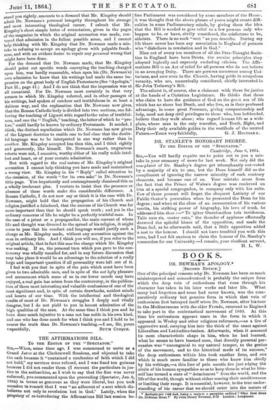THE AFFIRMATIONS BILL.
To THE EDITOR OF THE "SPECTATOR."
Sta,—When, some time ago, I was summoned to serve as a Grand Juror at the Clerkenwell Sessions, and objected to take the oath because it "contained a confession of faith which I did not hold," my services were refused, and I was fined ten guineas because I did not render them (I recount the particulars in jus- tice to the authorities, as I wish to say that the fine was never enforced), you commented upon the proceeding (Spectator, Jan. 9, 1864) in terms as generous as they were liberal, but you took occasion to remark that I was "an adherent of a sect which dis- believes not only in revelation but in God." Lately, when the propriety of re-introducing the Affirmations Bill last session be- fore Parliament was considered by some members of the House, it was thought that the above phrase of yours might create diffi- culties in some Parliamentary minds, by giving them the idea that the Bill is nseded to give relief to a few persons only who happen to be, or have, civilly considered, the misfortune to be, atheists. There is no such "sect" as you describe. During my life there never has been any association in England of persons who "disbelieve in revelation and in God." • Nine out of every ten members of all the Free-Thought Socie- ties in England have been Deists, the secular principles they adopted logically and expressly excluding atheism. Tho Affir- mations Bill is an Act of relief for all persons who do not believe in an avenging Deity. There are persons numerous among Uni- tarians, and now even in the Church, having pride in scrupulous veracity, who are, numerically considered, chiefly interested in Sir John Trelawny's Bill.
The atheist is, of course, also a claimant with these for justice at the hands of a Christian Legislature. He thinks that those who claim to have the guidance of God on the great sea of life which has no shore but Death, and who live,. as is their professed advantage, in some great Presence, giving companionship and help, need not deny civil privileges to those who, less befriended, believe that they walk alone; who regard human life as a wide plain, where man is the only traveller, and Truth, Right, and Duty their only available guides to the vestibule of the untried




























 Previous page
Previous page